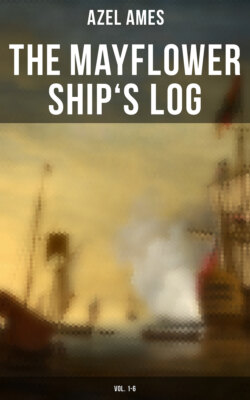Читать книгу The Mayflower Ship's Log (Vol. 1-6) - Azel Ames - Страница 7
На сайте Литреса книга снята с продажи.
CHAPTER I.
THE NAME—“MAY-FLOWER”
ОглавлениеTable of Contents
“Curiously enough,” observes Professor Arber, “these names [MAY-FLOWER and SPEEDWELL] do not occur either in the Bradford manuscript or in ‘Mourt’s Relation.’”
He might have truthfully added that they nowhere appear in any of the letters of the “exodus” period, whether from Carver, Robinson, Cushman, or Weston; or in the later publications of Window; or in fact of any contemporaneous writer. It is not strange, therefore, that the Rev. Mr. Blaxland, the able author of the “Mayflower Essays,” should have asked for the authority for the names assigned to the two Pilgrim ships of 1620.
It seems to be the fact, as noted by Arber, that the earliest authentic evidence that the bark which bore the Pilgrims across the North Atlantic in the late autumn of 1620 was the MAY-FLOWER, is the “heading” of the “Allotment of Lands”—happily an “official” document—made at New Plymouth, New England, in March, 1623—It is not a little remarkable that, with the constantly recurring references to “the ship,”—the all-important factor in Pilgrim history,—her name should nowhere have found mention in the earliest Pilgrim literature. Bradford uses the terms, the “biger ship,” or the “larger ship,” and Winslow, Cushman, Captain John Smith, and others mention simply the “vessel,” or the “ship,” when speaking of the MAY-FLOWER, but in no case give her a name.
It is somewhat startling to find so thorough-paced an Englishman as Thomas Carlyle calling her the MAY-FLOWER “of Delft-Haven,” as in the quotation from him on a preceding page. That he knew better cannot be doubted, and it must be accounted one of those ‘lapsus calami’ readily forgiven to genius,—proverbially indifferent to detail.
Sir Ferdinando Gorges makes the curious misstatement that the Pilgrims had three ships, and says of them: “Of the three ships (such as their weak fortunes were able to provide), whereof two proved unserviceable and so were left behind, the third with great difficulty reached the coast of New England,” etc.
